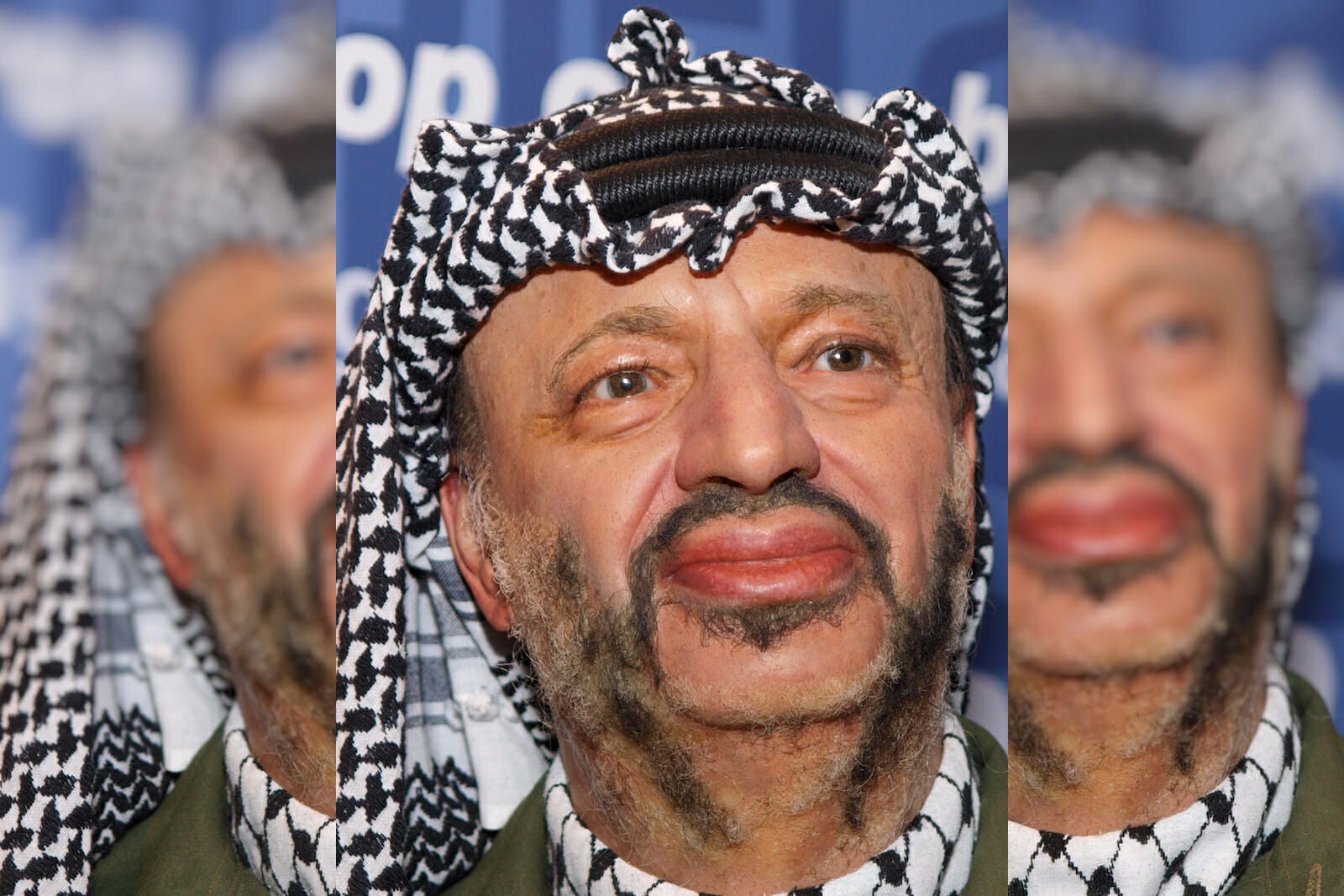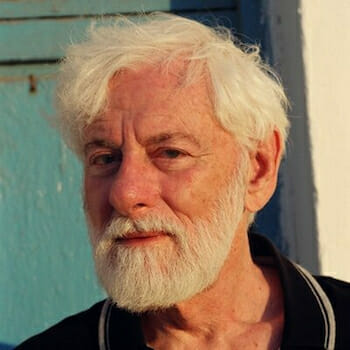
The Assassination of Yasser Arafat
From the first moment, I did not have the slightest doubt that Yasser Arafat was assassinated. It was a matter of simple logic. On the way back from the funeral, I happened upon Jamal Zahalka, a member of the Knesset for the nationalist Arab Balad party, who is a highly qualified doctoral pharmacist. We exchanged views and came to the same conclusion. The findings of the Swiss experts last week only confirmed my conviction.
First of all, a simple fact: people don’t just die for no reason. I visited Arafat a few weeks before it happened. He seemed in reasonably good health. Upon leaving, I remarked to Rachel, my wife, that he seemed more sharp and alert than during our last visit. When he suddenly became very ill, there was no obvious cause. The doctors at the French military hospital, to which he was transferred at the insistence of Suha, his wife, and where he died, conducted a thorough examination of his body. They found no explanation for his condition. Nothing. That by itself was very strange. Arafat was the leader of his people, the de facto head of a state, and one can be sure that the French doctors left no stone unturned to diagnose the case.
That left only radiation or poison. Why was no poison detected at the autopsy? The answer is simple: in order to detect poison, one must know what one is looking for. The list of poisons it almost unlimited and the routine search is restricted to a small number. Arafat’s body was not examined for radioactive polonium. Who had the opportunity to administer the poison? Well, practically anybody. During my many visits with him, I always wondered at the lax security precautions.
At our first meeting, in besieged Beirut, I wondered at the trust he put in me. It was known at the time that dozens of Mossad agents and Phalangist spies were combing the city for him. He could not be sure that I was not a Mossad agent myself, or that I was not followed, or that I was not unwittingly carrying some locating device.
Later, in Tunis, the security search of his visitors was perfunctory. The security precautions of the Israeli Prime Minister were immeasurably more stringent.
In the Ramallah Mukata’a (“compound”), no security measures were added. I had meals with him several times and wondered again at his openness. American and other foreign guests, who were (or seemed to be) pro-Palestinian activists were invited by him freely, sat next to him and could easily have slipped poison into his food. Arafat would joke with his guests and feed them choice tidbits with his hand.
Certain poisons do not need food. Slight physical contact is enough. Yet this man was one of the most threatened persons in the world. He had many deadly enemies, half a dozen secret services were bent on his destruction. How could he be so lax? When I remonstrated with him, he told me that he believed in divine protection.
Once, when he was flying in a private jet from Chad to Libya, the pilot announced that the fuel had run out. He was going to crash land in the middle of the desert. Arafat’s bodyguards covered him with cushions and formed a ring around him. They were killed, but he survived almost without a scratch. Since then he became even more fatalistic. He was a devout – though unostentatious – Muslim. He believed that Allah had entrusted him with the task of liberating the Palestinian people.
So who carried out the assassination? For me, there cannot be any real doubt. Though many had a motive, only one person had both the means and a profound and lasting hatred for him – Ariel Sharon.
Sharon was furious when Arafat slipped through his fingers in Beirut. Here was his quarry, so near yet so far. The Arab-American diplomat Philip Habib managed to make an arrangement which allowed the PLO fighters, including Arafat, to withdraw with honor from the city, with their arms. I was lying on the roof of a warehouse in Beirut Harbor when the PLO troops, flags flying, were driving by to the ships.
I did not see Arafat. His men were hiding him in their midst. Since then, Sharon made no secret of his determination to kill him. And when Sharon was resolved to do something, he never, but never, gave up. Even in much smaller matters, if he was thwarted, he would return to his effort again and again and again, until he succeeded.
I knew Sharon well. I knew of his determination. Twice, when I felt that Sharon was nearing his goal, I went with Rachel and some colleagues to the Mukata’a to serve as a human shield. Later we had the satisfaction of reading an interview with Sharon, in which he complained that he had not been able to carry out the planned assassination because “some Israelis were staying there.” This was much more than a personal vendetta. He – and not only he – saw it as a national aim.
For Israelis, Arafat was the embodiment of the Palestinian people, an object of abysmal hatred. He was hated more than any other human being after Adolf Hitler and Adolf Eichmann. The generations-old conflict with the Palestinian people was personified by this man.
It was Arafat who had resurrected the modern Palestinian national movement, whose supreme aim was to thwart the Zionist dream of taking possession of all the country between the sea and the Jordan. It was he who had led the armed struggle (a.k.a. terrorism). And when he turned towards a peaceful settlement, recognized the State of Israel and signed the Oslo Accords, he was even more hated. Peace was bound to give back a lot of territories to the Arabs, and what could be worse?
The hatred of Arafat had long since ceased to be rational. For many, it was a total, physical rejection, a deadly brew of hate, aversion, enmity, mistrust. In the forty or so years after he appeared on the stage, millions upon millions of words had been written about him in Israel, but I truly believe that I have never seen a single positive word about him.
For all those years, an entire army of paid propaganda hacks conducted a relentless demonization campaign against his person. Every conceivable accusation was thrown at him. The assertion that he had AIDS, which is now so prominent in the Israeli covert propaganda effort, was invented then in order to mobilize homophobic prejudices. Needless to say, no evidence of homosexuality was ever presented. And the French doctors found no trace of AIDS.
Is the Israeli government capable of deciding to carry out such a deed? It is an established fact that it is. In September 1997, an Israeli hit squad was sent to Amman to assassinate Khalid Mishal, the Hamas leader. The chosen instrument was levofentanyl, a deadly poison that leaves no traces and produces effects like a heart attack. It was administered by a slight physical touch.
The act was bungled. The killers were detected by passers-by and fled into the Israeli embassy, where they were besieged. King Hussein, generally an Israeli collaborator, was furious. He threatened to hang the perpetrators unless a life-saving antidote was provided at once. The then Prime Minister Benjamin Netanyahu caved in and sent the Chief of the Mossad to Amman with the required medicine. Mishal was saved.
Later, in 2010, another squad was sent to assassinate another Hamas operative, Mahmoud al-Mabhouh in a Dubai hotel. They bungled the job, too – though they succeeded in killing their prey by paralyzing and then suffocating him. They were filmed by the hotel cameras and their identity disclosed. God knows how many un-bungled murders have been carried out this way.
Israel, of course, is not alone in this field. Before, a Russian spy, Alexander Litvinenko, was ill-advised enough to displease Vladimir Putin. He was killed by the same radioactive polonium as Arafat, but before he died an alert doctor detected the poison. Even before, a Bulgarian dissident was poisoned by a tiny pellet fired from an umbrella, One must assume that every self-respecting secret service has suchlike means of murder.
Why didn’t Sharon kill Arafat before? After all, the Palestinian leader was besieged for a very long time in his Ramallah compound. I myself saw Israeli soldiers a few meters away from his office.
The answer is political. The US was afraid that if Israel was seen killing the PLO chief, a hero to tens of millions around the Arab world, the region would explode against the US. George Bush the son forbade it. The answer was to do it in a way that could not be traced to Israel.
This, by the way, was quite usual for Sharon. A few weeks before his 1982 invasion of Lebanon, he told the US Secretary of State, Alexander Haig, about his plan. Haig forbade it – unless there was a credible provocation. Lo and behold, a dastardly attempt was made on the life of the Israeli ambassador in London, the provocation was duly deemed to be intolerable and the war started.
For the same reason, the Netanyahu government now strenuously denies Israeli involvement in the assassination of Arafat. Instead of bragging about the successful operation, our powerful propaganda machine asserts that the Swiss experts are incompetent or lying (probably they are also anti-Semites) and that the conclusions are wrong. A respected Israeli professor is trotted out to declare that it is all nonsense. Even the good old story about AIDS is called out of retirement. Sharon himself, in his endless coma, cannot react. But his old assistants, all of them seasoned liars, repeat their mendacious stories.
To my mind, the assassination of Arafat was a crime against Israel. Arafat was the man who was ready to make peace and who was able to get the Palestinian people to accept it. He also laid down the terms: a Palestinian state with borders based on the Green Line, with its capital in East Jerusalem. This is exactly what his assassins aimed to prevent.

